May 15, 2002: Notebook
Facuty file: The look of history
Cornel
West *80 leaves Harvard for Princeton
Move will bolster Program in African-American Studies
Alumnus
to design Whitman College
Trustees select traditionalist architect Demetri Porphyrios *80
Preceptorials get mixed reviews
Read online at Web Exclusives:
This side of love
A new book examines
the marriage of one of Princeton’s favorite literary sons, F. Scott
Fitzgerald ’17.
By Louis Jacobson ’92
The threat to all
How Princeton professors
examine terrorism.
By Melissa Harvis Renny ’03

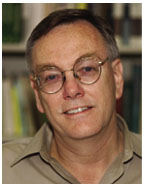 Facuty
file:
Facuty
file:
The
look of history
Photo by Ricardo Barros
Michael Jennings likes picture books. But he doesn’t just flip through the pages and read the captions. Instead, he studies photograph books produced in Germany since 1920 to determine the connection between them and contemporaneous events.
“I’m interested in photo books that tell stories and produce arguments through sequences of images,” says Jennings, chair of the department of Germanic languages and literatures. In particular, he is focusing on five key moments, including the breakdown of Germany’s first experiment with democracy in the late 1920s and the Third Reich. For example, in the late 1920s as Germany wrestled with whether to become an agrarian or industrial nation, writers, journalists, and legislators weighed in on the question. But “no one had looked at these photo essays as an intervention in that debate,” says Jennings.
Like Jennings, whose work in literary theory incorporates elements from other fields — philosophy, politics, and art — the research of his colleagues in the department has become increasingly interdisciplinary. “We probably have the strongest new media presence in any German department in the country,” says Jennings, who has been at Princeton for 21 years. He has taught Politics and Culture in the Weimar Republic and Nietzsche and Modern Literature, and next fall will teach a course on photography and literature.
As the faculty has pushed the department in new scholarly directions,
more students have signed on as majors. Today, about 13 students are majoring
in German, up from about three students per class in the mid-1990s. In
all, about 240 undergraduates have taken one or more courses in the department
this semester. ![]()
By K.F.G.

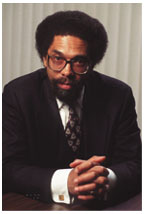 Cornel
West *80 leaves Harvard for Princeton
Cornel
West *80 leaves Harvard for Princeton
Move will bolster Program
in African-American Studies
Cornel West *80, left (Harvard University)
Following months of speculation, religion professor Cornel West *80 is returning to Princeton after eight years at Harvard, where he recently generated a media frenzy with a very public falling-out with the university’s president.
West’s Princeton appointment was announced on April 12 and approved by the Board of Trustees the following day. West, who served on the Princeton faculty as a religion professor and head of the Program in African-American Studies from 1988 to 1994, will return on
July 1 as the Class of 1943 University Professor of Religion.
“Cornel West, who is known for his intellectual contributions in the study of religion and for challenging those both inside and outside academia to think about critical issues of race, was a popular and dedicated teacher during his previous tenure at Princeton, and we are pleased that he has decided to return,” said President Tilghman in the university’s announcement.
West is the second member of the so-called Dream Team at Harvard’s W.E.B. Du Bois Institute for Afro-American Research to make the jump to Old Nassau within the last three months as Princeton officials continue to enhance the university’s African-American studies program. Philosophy professor K. Anthony Appiah’s appointment was announced in February. The Harvard institute’s director, Henry Louis Gates, Jr., has said that he will wait until the summer to decide whether to follow his colleagues. But West has said publicly that Gates is leaning toward Princeton.
Another faculty member joining the religion department is Eddie Glaude *95, a former student of West’s who was appointed associate professor. Glaude, currently an associate professor of religion and Africana studies at Bowdoin College, said he is “convinced that something really special is happening at the institution, and I look forward to being a part of it.”
West said he is excited to return to “the greatest center for humanistic studies in the country.”
“I look forward to being a part of President Tilghman’s vision that promotes high-quality intellectual conversation mediated with respect,” said West in the university’s announcement.
In press interviews following his appointment, West also cited Tilghman’s and Provost Amy Gutmann’s concern for his health after his prostate cancer surgery in January as one of the pull factors that led him to return. He told National Public Radio’s Travis Smiley on April 15 that Tilghman and Gutmann called him almost every week after his operation, which had forced him to take a medical leave of absence.
The rift between Harvard president Lawrence Summers and West began after an October conversation in which the Harvard president questioned West’s scholarly work. According to West’s comments to the media, Summers criticized West’s rap/spoken-word CD, his involvement with Bill Bradley ’65’s presidential campaign, and West’s place on the committee exploring New York City activist Al Sharpton’s possible run for president in 2006. West said other issues involved Harvard’s commitment to diversity and comments about grade inflation in West’s classes.
But one person close to West said he had been considering returning to Princeton for more than a year and that the conversation between Summers and West was an added push.
West’s critics have referred to his CD, Sketches of My Culture, which was released in December, and described his recent writing as nonacademic. But in the Cornel West Reader, a collection of his writings published in 1999, West stated that he “never aspired to be a professional academic or scholar.
“Instead, I have tried to be a man of letters in love with ideas in order to be a wiser and more loving person, hoping to leave the world just a little better than I found it,” he wrote.
Along those lines, West’s older brother, Clifton West, who produced Sketches of My Culture, said he would characterize the CD as an extension of his brother’s classroom. It’s “an attempt at instruction, reaching those outside the confines of the walls of academia through a popular culture medium,” he said.
West’s most influential scholarly work, The American Evasion of Philosophy: A Genealogy of Pragmatism, which he wrote while at Princeton in 1989, is a history of pragmatism from Emerson to the present. “It would be accurate to say that he has reshaped religious studies in such a way that his area of interest is now seen as central to the field,” said Jeffrey Stout, a professor of religion at Princeton.
West’s most popular book, Race Matters, sold nearly 400,000 copies
and influenced a national dialogue on race. The book played a large role
in transforming West into a public intellectual who is not afraid to get
arrested for protesting the policies of Israeli Prime Minister Ariel Sharon
or to stump for New York state gubernatorial candidate Andrew Cuomo, both
of which he did in the days following his appointment at Princeton. ![]()
By A.D.
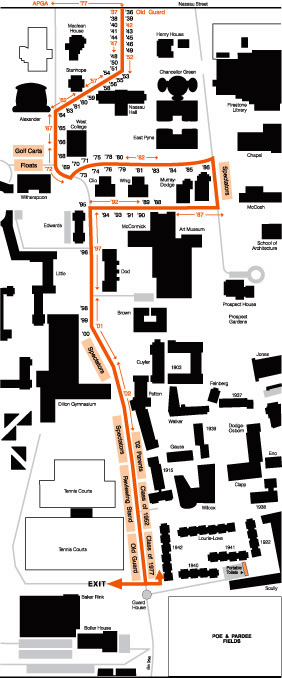 This
year, Reunions will be the same, but different. Due to construction, the
P-rade route has been modified slightly. Instead of lining up behind Nassau
Hall, reuners in the Classes 1959 through 1970 will string along the road
behind Stanhope. Classes from the 1970s through 1986 will line up in the
road in front of Whig and Clio, and 1987 through 1994 will file from the
walk in front of the Art Museum. The rest of the younger classes will
be on the regular route along Elm Drive.
This
year, Reunions will be the same, but different. Due to construction, the
P-rade route has been modified slightly. Instead of lining up behind Nassau
Hall, reuners in the Classes 1959 through 1970 will string along the road
behind Stanhope. Classes from the 1970s through 1986 will line up in the
road in front of Whig and Clio, and 1987 through 1994 will file from the
walk in front of the Art Museum. The rest of the younger classes will
be on the regular route along Elm Drive.
Fireworks this year will be set off from boats on Lake Carnegie; viewers
should gather at Finney Field, between the baseball field and Jadwin Gym.
![]()

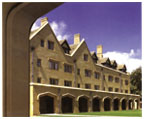 Alumnus
to design Whitman College
Alumnus
to design Whitman College
Trustees select traditionalist
architect Demetri Porphyrios *80
Photo: Grove Quadrangle at Magdalen College at Oxford University, which Porphyrios designed. (porphyrios associates)
Demetri Porphyrios *80, considered one of the world’s leading traditional-style architects and theorists, was selected to design the university’s sixth residential college by the Board of Trustees at its April 13 meeting. Porphyrios earned a master of architecture degree in 1974, a master of arts degree in 1975, and a doctorate in architecture in 1980, all at Princeton.
His London-based firm, Porphyrios Associates, was chosen from an original list of 16 firms that work in traditional architectural styles. The board’s decision came after trustees reviewed a feasibility study Porphyrios developed to determine whether his firm could complete the project within a proposed $100-million budget and a time frame that calls for the college to be ready by fall 2006.
The process initially hinged on the choice of architectural style for the college, according to Jon Hlafter ’61 *63, director of physical planning. “The trustees decided that the building should be in the collegiate-gothic style, like Princeton’s dormitory buildings from the first third of the 20th century,” said Hlafter in a statement. “They felt the new college needed to speak the same language as the surrounding buildings.”
The 230,000-square-foot Whitman College, named for university trustee Meg Whitman ’77, who donated $30 million toward the project, will be constructed north of Baker Rink.
Porphyrios designed student accommodations, administrative offices, and an auditorium for the Grove Quadrangle at Oxford University’s Magdalen College in 1994 and at Cambridge University’s Selwyn College, where he also designed a library, in 1996.
“Porphyrios is really one of the premier architects in the world
in terms of traditional style and working with traditional architecture,”
said Elizabeth Plater-Zyberk ’72, chair of the trustee grounds and
buildings committee and dean of the School of Architecture at the University
of Miami. “I think we couldn’t have found a better firm to do
this.” ![]()
By A.D.

Preceptorials get mixed reviews
Princeton’s Undergraduate Student Government put the university’s precept system under the microscope last September, and its recently released report on the current state of the unique Princeton institution concludes there is much to be desired of the instruction method. But there is also room for hope.
“Our report indicates that the precept system fails to provide an inspiring, intellectually stimulating environment for many students,” the report released April 8 states. It also said that “there is good reason for optimism.” While nearly 74 percent of the students surveyed rated their precept experience as “good” or “excellent,” close to 26 percent rated it as “fair” or “poor,” and the report states that several multiple choice questions and the “unmistakable tone of our free-response data” indicate a high level of student dissatisfaction.
The USG sent e-mail surveys to all members of the Classes of 2002, 2003, and 2004 and received 1,660 responses. The USG precept reform committee began its review process by researching the history and mission of the system that university president Woodrow Wilson put into place in 1905. Wilson saw the system, which doubled the size of the faculty at the time, as an opportunity to “import into the great university the methods and personal contact between teacher and pupil which are characteristic of the small college, and so gain the advantages of both,” according to A Princeton Companion.
Josh Anderson ’04, who chaired the committee, said the mission of the precept system remains unchanged today and that the committee defined the ideal precept as one that “should be made to provide an opportunity for deep exploration of ideas through active exchange.”
Preceptors also indicated some dissatisfaction with the system. Some preceptors said that insufficient guidance from professors, lack of preparation on the part of students, and small remuneration for many instructors – as little as $300 per semester – are issues that need to be addressed with the system, according to Graduate Student Government Press Secretary Meredith Safran.
“When undergraduates come to precept prepared and when professors explicitly communicate with both preceptors and undergraduates, all parties stand to benefit,” said Safran in a written statement.
The USG report outlines several recommendations to improve the system,
including mandatory teacher training for graduate students, expanding
the McGraw Teaching and Learning Center’s mentoring program, which
increases faculty/preceptor interaction, rewarding excellent preceptors,
and reaffirming student commitment. ![]()
By A.D.
Precept
system:
A majority of students seem
to be content with the current functioning of the precept system.
Of 1,660 students who responded to an e-mail survey to all members of the classes of ’02, ’03, and ’04:
65% rated their experiences as good
8% rated their experiences as excellent
24% rated their experiences as fair
3% rated their experiences as poor
When asked to describe broadly their precept experiences:
29% exhibited a negative tone
23% demonstrated considerable ambivalence
Source: Report on the Status of the Princeton Precept System, April 8, 2002, www.princeton.edu/usg

To offset a higher yield than expected last year, Princeton offered admission to just 1,575 high school students, down from 1,677 at this time last year. Of the 14,521 applicants for the Class of 2006, 10.8 percent were accepted. The university received 14,289 applications for the Class of 2005 and accepted 11.7 percent. The expected enrollment is 1,160.
Of the admitted applicants, 51.6 percent were men and 48.4 percent were women; they come from all 50 states and 46 other countries. International students comprise about 10 percent. Of the U.S. citizens offered admission, 37.7 percent indicated a minority background. Children of alumni make up 10 percent of those offered admission (the admit rate for legacies was 34.1 percent.) A little more than a third of the students were accepted via early decision last December.
Fifty-seven percent of the applicants had grade-point averages of 3.8
or higher; some 4,794 had a 4.0 G.P.A. Dean of Admission Fred. A. Hargadon
told the Daily Princetonian that the university has admitted many more
dancers and musicians this year.
![]()

Photo by Michelle Lee
In addition to hiring Cornel West *80, the Board of Trustees approved
the faculty appointments of Chang-rae Lee (right), a writer, as professor
in the Council of the Humanities and the Program in Creative Writing,
and Andrew Okounkov and Rahul Pandharipande as professors in the mathematics
department. The board also promoted to associate professor, granting tenure:
Edgar Yazid Choueiri, mechanical and aerospace engineering; Joshua Robert
Goldstein, Woodrow Wilson School and sociology; Frederick McLaury Hughson,
molecular biology; Tali Mendelberg, politics; Isabelle Rolande Nabokov,
anthropology, and D. Vance Smith, English.
![]()

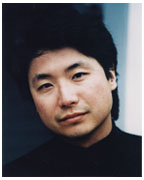 Appointments
Appointments